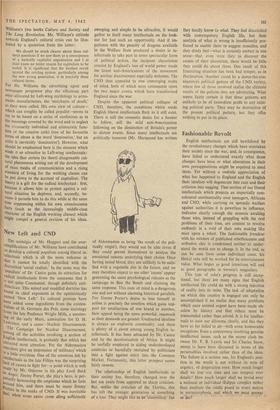New Left and CND
The nostalgia of Mr. Hoggart and the over- simplifications of Mr. Williams have contributed to develop a cultural populism among liberal in- tellectuals which is all the more welcome in that it cannot be totally identified with the discredited 'social realism.' In the same way the Populism' of Dr. Castro gains its attraction for radical intellectuals from the assurance that it is not quite Communist, though definitely anti- American. This mixed and muddled doctrine has found its chief exponents in the optimistically named 'New Left.' To cultural protests have been added some ingredients from the existen- tialism of St. Germain des Pres, some sociology from the late Professor Wright Mills, a smatter- ing of the early Marx, admiration for D. H. Lawrence, and a cause—Nuclear Disarmament. The Campaign for Nuclear Disarmament, among all the activities involving a section of English intellectuals, is probably that which has attracted most attention. Yet the Aldermaston marchers give an impression of militancy which !S a little overdone. One of the emotions felt by intellectuals in the late Fifties was the surprising lack of causes to fight for—a point which is well made by Mr. Osborne in his play Look Back `n Anger. Jimmy Porter, the play's hero, is per- petually bemoaning the emptiness which he feels around him, and there must be many Jimmy Porters in the ranks of CND: It was inevitable that, when some cause came along sufficiently sweeping and simple to be attractive, if would gather to itself many intellectuals on the look- out for just such an opportunity. And if im- patience with the paucity of dragons available in the Welfare State produced a desire in in- tellectuals to take part in some spectacular form of political action, the incipient chauvinism created by England's loss of world power made the latent anti-Americanism of the movement for nuclear disarmament especially welcome. The CND thus appealed to two converging states of mind, both of which were consequent upon the two major events which have transformed England since the war.
Despite the apparent political collapse of CND, therefore, the conditions which made English liberal intellectuals flock to it still exist. There is still the romantic desire for a banner to follow, still the mild anti-Americanism following on the diminution of Britain's power to dictate events. Since many intellectuals are politically innocent (Mr. Marquand has written of Aldermaston as being 'the revolt of the poli- tically virgin'), they would not be able (even if they could permit themselves) to analyse the emotional reasons underlying their choice. Once having tasted blood, they are unlikely to be satis- fied with a vegetable diet in the future, and we may therefore expect to see other 'causes' appear generating the same psychological releases as the campaign to Ban the Bomb and claiming the same response. This state of mind is a dangerous one and not without alarming historical parallels. For Jimmy Porter's desire to lose himself in action is precisely the emotion which gains sup- port for totalitarians of one brand or another, their appeal being the more powerful, inasmuch as their demands are greater. Undirected idealism is always an explosive commodity, and there is plenty of it about among young English in- tellectuals. It has been attracted by Dr. Castro and by the decolonisation of Africa. It might be usefully employed in aiding underdeveloped countries or harmfully recruited by politicians into a fight against entry into the Common Market. Fortunately, this latter prospect seems fairly remote.
The relationship of English intellectuals to their society has, therefore, changed over the last ten years from approval to sharp criticism. But, unlike the criticism of the Thirties, this has left the younger generation at something of a loss. They might like to be 'committed,' but they hardly know to what. They feel dissatisfied with contemporary English life, but their analysis of what is wrong is insufficiently pro- found to enable them to suggest remedies, and they dimly feel—what is certainly correct in one sense—that, even were they to discover the causes of their discontent, there would be little they could do about them. One result of this frustrating situation has been bad temper, as in Declaration. Another could be a damn-the-con- sequences political gesture of the CND variety, where few of those involved realise the ultimate results of the policies they are advocating. What seems fairly certain is that these gestures are unlikely to be of immediate profit to any exist- ing political party. They may be destructive of the present political pattern, but they offer nothing to put in its place.






































 Previous page
Previous page